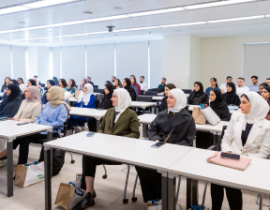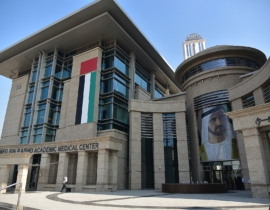First Whole Genome Sequencing of an Emirati Boy with Autism Conducted in the UAE at MBRU
A first for the United Arab Emirates, a whole genome-sequencing of an Emirati Boy with Autism Spectrum Disorder (ASD) was conducted at Mohammed Bin Rashid University of Medicine and Health Sciences (MBRU), as part of a collaborative research with the Autism Program at Al Jalila Children’s Specialty Hospital (Al Jalila Children’s), in Dubai Healthcare City.
As humans our genome, which is the complete set of genes or genetic material present in a cell, is composed of DNA that is packed within 23 pair of chromosomes. A typical genome is 3 billion base pair long and has more than 20,000 genes. Reading or sequencing human genome is becoming critical for diagnostic and therapeutic purposes. Autism spectrum disorder (ASD) is highly genetic and through genome sequencing a good number of cases can have precision diagnosis.
A scientific team from MBRU’s molecular lab led by Assistant Professor of Human Genetics, Mohammed Uddin, College of Medicine, has sequenced the first whole genome, of an Emirati boy with Autism from Al Jalila Children’s ASD program, making it the first time in the UAE. MBRU’s scientific team, which also included four students from the college of medicine, applied a portable nano long-range DNA sequencer to conduct whole genome sequencing.
Dr. Uddin said, “The team and I are sequencing or reading a whole genome of a boy with Autism through nanopore sequencing; a technology that allows long read DNA sequencing. It’s a new technology that’s more innovative than the established sequencing technologies, due to its portability and its ability to decipher a full spectrum of genetic mutations. Whole genome sequencing and analysis of the genome is a complex process that requires deployment of sophisticated sequencing technology and massive high performance computing power. Comprehensive analysis of a genome usually take months to understand the mutations and its functional aspect. Although MBRU is fairly young, we’re proud of our internal infrastructure, our team of scientists and our students who were all able to take on this research project, which is a first for the UAE. We hope that through our research we will be able to detect new genes that will aid precision diagnosis and future therapeutics of autism.”
From AJCH, the co-principal investigator of the study, Dr. Ammar Al Banna, Adjunct Assistant Professor of Psychiatry at MBRU, and Head of Child and Adolescent Mental Health Center of Excellence at Al Jalila Children’s, said: “Research indicates that Autism is largely due to genetic factors and it is important to understand specific genetic factors associated with Autism Spectrum Disorder in the UAE. The main objective of genetic testing at present is to reach a more accurate diagnosis, predict recurrence rates within the family and screen for other conditions, but providing personalized treatments based on the underlying genetic causes is the ultimate goal in future. At Al Jalila Children’s, we have a multidisciplinary specialized team that provides comprehensive evidence-based assessments for children with ASD. We also run prospective clinical research studies and are collaborating with Dr. Uddin’s team at MBRU on this important genomic study.”
Dean of the College of Medicine, Professor Alawi Alsheikh-Ali said, “We’re proud to be the first to sequence or read an entire genome in the UAE, and we’re particularly proud of the fact that four of our students from the College of Medicine are part of the research project.”
In line with the UAE’s current focus on genome projects, MBRU is implementing a genome-sequencing technology to streamline precision medicine for neurodevelopmental disorders within Dubai. Professor Uddin and his team are planning to conduct a number of autism genome-sequencing research projects in collaboration with AJCH.


